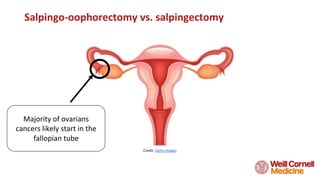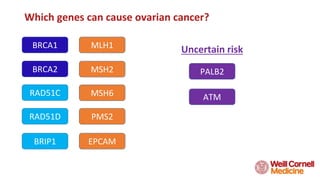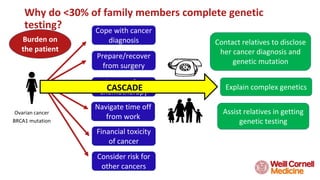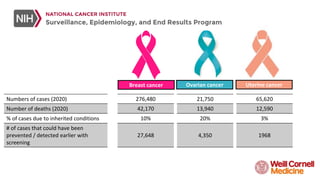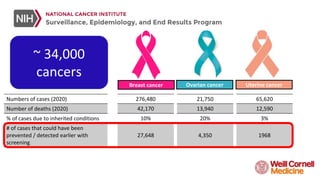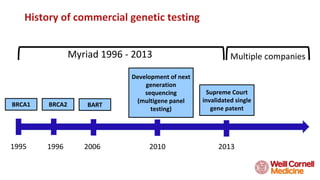All in the Family: Hereditary Risk for Gynecologic Cancer
- 1. All in the Family How genes affect gynecologic cancer risk January 2021 Melissa Frey M.D. Assistant Professor Division of Gynecologic Oncology Weill Cornell Medicine Obstetrics and Gynecology
- 2. Research support • NIH/NCATS Grant # KL2-TR-002385 • Invitae • Ambry Introduction • Gynecologic oncologist at Weill Cornell Medicine • Clinical care (surgery/chemotherapy) for women with all gynecologic cancers • Clinical and research focus on genetics and cancer
- 3. Definitions
- 4. Definitions for hereditary cancer • Cells are the building blocks of the body – they make up all of the organ’s and tissues • Every cell contains DNA (deoxyribonuecleic acid) • Hereditary material • The code for building and maintaining cells • Sections of DNA are called genes • Instructions for the cells • Many genes together form chromosomes • People inherit 2 pairs of chromones (23 from their mother and 23 from their father)
- 5. DNA, Genes, Chromosomes, Cells ACGTAATTCCGGAAATTAAAGTTCAGGA A DN A Genes ACGTAATTCCGGAAATTAAAGTTCAGGAACGGAAATTAAAGCGGAAATTAAAGTT Chromosome s A C G T A T T A C G G T G T A T G G G A C G G T Cells Nucleus
- 6. How are genes passed to next generation?
- 7. How are genes passed in families? 23 pairs of chromosomes
- 8. How are genes passed in families? 23 pairs of chromosomes
- 9. How are genes passed in families? 23 pairs of chromosomes
- 10. How are genes passed in families? 23 pairs of chromosomes
- 11. How are genes passed in families? 23 pairs of chromosomes BRCA mutation BRCA mutation BRCA mutation BRCA mutation 1. BRCA can be inherited from mother or father 2. Just 1 copy 🡪 cancer risk
- 12. BRCA1/2
- 13. BRCA1/2 Cancer Risk Breast cancer >60% Ovarian cancer BRCA1 – 40-60% BRCA2 – 15-30% Pancreatic cancer BRCA1 - < 5 % BRCA2 – 5-10% Melanoma Prostate cancer
- 14. For a woman with ovarian cancer, what do we learn by finding a BRCA1/2 mutations? Treatment implications PARP inhibitors Risk of other cancers Breast, Melanoma, Pancreas Risk for family members First degree relatives (50% risk)
- 15. What are options for BRCA1/2 cancer risk reduction? Breast cancer Mammogram / MRI Risk-reducing mastectomy Risk-reducing medical therapy
- 16. BRCA1/2 BREAST cancer risk reduction Age Intervention 25y Clinical breast exam ever 6-12 months 25-29y Breast MRI every 12 months 30-75y Mammogram and breast MRI every 12 months Discuss option of risk-reducing mastectomy Discuss option of chemoprevention (Tamoxifen)
- 17. What are options for BRCA1/2 cancer risk reduction? Breast cancer Mammogram / MRI Risk-reducing mastectomy Risk-reducing medical therapy Ovarian cancer Risk-reducing salpingo- oophorectomy Oral contraceptive pills
- 18. BRCA1/2 OVARIAN cancer risk reduction 35-40y Risk-reducing salpingo-oophorectomy (Reasonable to wait until 40-45y in BRCA2) Age Intervention 30-35y Consider transvaginal sonogram + serum CA125 Oral contraceptive pills Discuss option for hysterectomy Salpingectomy (however…alone is not standard of care)
- 19. Salpingo-oophorectomy vs. salpingectomy Credit: Getty Images Fallopian tube Ovary
- 20. Salpingo-oophorectomy vs. salpingectomy Credit: Getty Images Salpingo-oophorectomy Remove ovaries and fallopian tubes Standard of care Surgical Menopause
- 21. Salpingo-oophorectomy vs. salpingectomy Credit: Getty Images Majority of ovarians cancers likely start in the fallopian tube
- 22. Salpingo-oophorectomy vs. salpingectomy Credit: Getty Images Salpingectomy Remove fallopian tubes Not standard of care Is this safe oncologically? Benefit - No surgical Menopause
- 23. What are options for BRCA1/2 cancer risk reduction? Breast cancer Mammogram / MRI Risk-reducing mastectomy Risk-reducing medical therapy Ovarian cancer Risk-reducing salpingo- oophorectomy Oral contraceptive pills Pancreatic cancer MRCP / MRI Endoscopic ultrasound Melanoma Dermatologic exam Ophthalmology exam
- 24. Lynch syndrome
- 25. Lynch syndrome • Colorectal cancer – 50-60% • Endometrial cancer – 30-60% • Ovarian cancer – 4-40% • Breast cancer – 10-18% • Gastric (stomach cancer) – 5-9% • Pancreatic cancer – 6% • Prostate cancer – 4-11% • Bladder cancer – 2-13% • Biliary tract cancer – 2-4% • Kidney cancer – 0-30% • Brain cancer – 1-2% MLH1 MSH2 MSH6 PMS2 EPCAM
- 26. For a woman with ovarian cancer, what do we learn by finding a Lynch syndrome mutation? Treatment implications Immunotherapy Risk of other cancers Colon, uterine Risk for family members First degree relatives (50% risk)
- 27. What are options for Lynch syndrome cancer risk reduction? Uterine / ovarian cancer Pelvic ultrasound Endometrial biopsy Risk-reducing surgery (hysterectomy, bilateral salpingo-oophorectomy) Pancreatic cancer MRCP / MRI Endoscopic ultrasound Skin cancer Dermatologic exam Gastrointestinal cancer Colonoscopy Endoscopy
- 28. Do genes contribute to ovarian and breast cancer?
- 30. Which genes can cause ovarian cancer? BRCA1 BRCA2 RAD51C RAD51D BRIP1 MLH1 MSH2 MSH6 PMS2 EPCAM PALB2 ATM Uncertain risk
- 31. Breast cancer Genetic mutation 10% No genetic mutation 90%
- 32. Which genes can cause breast cancer? BRCA1 BRCA2 ATM BARD1 BRIP1 CDH1 CHEK2 NF1 PALB2 PTEN MSH6 PMS2 NBN RAD51C RAD51D STK11 TP53 Uncertain risk
- 33. For women with ovarian cancer, what are the implications of genetic testing? Ovarian cancer Clarify cause of cancer Targeted therapy Risk of other cancers BRCA1 mutation
- 34. For women with ovarian cancer, what are the implications of genetic testing? Ovarian cancer Clarify cause of cancer Targeted therapy Risk of other cancers BRCA1 mutation CASCADE TESTING
- 35. Cascade genetic testing cas·cade a process whereby something, typically information or knowledge, is successively passed on Cancer cascade testing – offering relatives (who are also at risk for carrying the mutation) the option for genetic assessment
- 36. Ideal use of genetic testing and cascade testing Ovarian cancer Targeted therapy (PARP inhibitor) Prevention of other cancers Relatives Genetic testing (Cascade) Relatives with BRCA1/2 mutation Cancer prevention! BRCA1 mutation <30 % of relatives get tested
- 37. Why do <30% of family members complete genetic testing? Ovarian cancer BRCA1 mutation Prepare/recover from surgery Prepare for chemotherapy Navigate time off from work Financial toxicity of cancer Cope with cancer diagnosis Consider risk for other cancers Burden on the patient Contact relatives to disclose her cancer diagnosis and genetic mutation Explain complex genetics Assist relatives in getting genetic testing CASCADE
- 38. Cascade testing • Research at Weill Cornell evaluating clinician-facilitated cascade testing • Telephone genetic counseling for relatives • Option for genetic testing with a mailed saliva kit • Goals • 1. Transfer burden of cascade testing from the newly diagnosed patient to the clinical team • 2. Prioritize the convenience of relatives
- 39. Clinician-facilitated cascade testing 36 year old Stage IV ovarian cancer BRCA1/2 Mutation
- 41. Clinician-facilitated cascade testing BRCA+ BRCA+ BRCA+ BRCA+
- 42. Why is it critical to identify women with BRCA1/2 mutations and Lynch syndrome? What are the population-based implications?
- 43. Breast cancer Numbers of cases (2020) Number of deaths (2020) % of cases due to inherited conditions # of cases that could have been prevented / detected earlier with screening Ovarian cancer 21,750 13,940 20% 4,350 Uterine cancer 65,620 12,590 3% 1968 276,480 42,170 10% 27,648
- 44. Breast cancer Numbers of cases (2020) Number of deaths (2020) % of cases due to inherited conditions # of cases that could have been prevented / detected earlier with screening Ovarian cancer 21,750 13,940 20% 4,350 Uterine cancer 65,620 12,590 3% 1968 276,480 42,170 10% 27,648 ~ 34,000 cancers
- 45. Should genetic testing ever be repeated?
- 46. What type of genetic testing did you have?
- 47. Types of genetic testing Single site Ashkenazi Jewish 3-site Single gene (e.g. BRCA1/2) Multigene panel
- 48. When was the genetic testing completed?
- 49. History of commercial genetic testing 1995 Myriad 1996 - 2013 Multiple companies BRCA1 1996 BRCA2 2006 BART Development of next generation sequencing (multigene panel testing) 2010 Supreme Court invalidated single gene patent 2013
- 50. Repeating genetic testing •Yes, sometimes repeat genetic testing is indicated • Based on changes in technology • Based on changes in family history • Based on changes in knowledge of genetic syndromes •Genetic assessment by an oncologist or genetic counselor is critical!
- 51. Summary • Inherited mutations account for about 20-25% of ovarian cancers • Information about a genetic mutation has many health implications • Cancer treatment • Risk for other cancers • Risk for cancer among relatives • Genetic testing is complex and dynamic • Sometimes repeat genetic testing is warranted • For those with mutations, communication with family members is critical (and something the medical team should facilitate)
- 52. Thank you! Melissa Frey MD Evelyn Cantillo MD MPH Kevin Holcomb MD Eloise Chapman-Davis MD Weill Cornell Medicine – Gynecologic Oncology





















